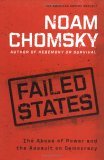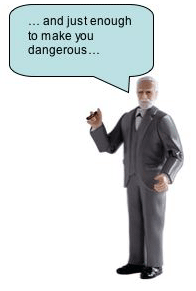Yesterday I wrote about over-your-head learning, and said that can only get you so far.
One way to go further is head-to-head learning.
In a nutshell, it's hearing both sides of an argument fully before arriving at a conclusion. Not so revolutionary, but there seems to be a dearth of it in a soundbite-driven cultue.
"What do you think of the war?"Last year,
Sandra asked what I thought of the war in Iraq.
I had to admit I had very little clue, because I have very little real knowledge of the real situation.
Instead, I've got what I guess most people have - sound bite arguments for and against.
For:
- Saddam was a bad man who killed many people.
- The world is safer now he's not there.
- What if the US had not gone to war in World War II?
Against:
- War is bad because people get killed.
- There were no Weapons of Mass Destruction.
- George Bush is stupid, evil and goofy.
Hardly intelligent arguments, although it's a very good point that there were no Weapons of Mass Destruction.
Anyway, I thought I'd best get some in-depth education, so I read two books, one for each side of the argument.
For the War The Case For Democracy: The Power of Freedom to Overcome Tyranny and Terror
The Case For Democracy: The Power of Freedom to Overcome Tyranny and Terror
isn't exactly about the war in Iraq, but it does champion America's role to build and encourage free societies around the world.
It's written by
Natan Sharansky, a former Israeli cabinet minister and, before that, a refusenik dissident in the Soviet Union who was imprisoned and tortured under that regime. He speaks with great passion about the difference between a free society, like America, where you can express your dissenting opinion freely, and a "fear society" like Iraq under Hussein, where dissent voices are muted, imprisoned or killed.
Against the War Failed States : The Abuse of Power and the Assault on Democracy
Failed States : The Abuse of Power and the Assault on Democracy
points a big, accusing finger at the United States for failing just about every aspect of its mission to uphold democracy, not only around the world but also at home.
Its author,
Noam Chomsky, is an outspoken critic of US Foreign Policy. I'd heard of him previously in the documentary
The Corporation, and also by him being described as dangerous by, I believe, the
National Business Review.
He's used to being disagreed with, apparently, and his book is extensively footnoted with research into the sometimes quite shocking accusations he's making against America - interestingly, not just the George W Bush regime, but against American foreign policy dating back to 1819!
Unexpected HarmonyI'm using these books as examples of head-to-head learning, assuming that they're diametrically opposed. They are in terms of their conclusions about the US occupation of Iraq, but in terms of base ideas they harmonise remarkably. Both books agree that a genuinely free, democratic society is the most desirable way to achieve national prosperity and global security today.
My TakeSo what am I to make of this head-to-head learning??
I'm definitely against a war waged on the basis of a lie. In that respect I take Chomsky's side. But I disagree with him that the longer America stays in Iraq, the more dangerous it is for America and the world. If America is actually helping the fledgling Iraqi government achieve and maintain control of their own backyard, let's not get them out until they're finished doing that job.
Of course, this is not my set-in-concrete position. Opinions based on current affairs must always be subject to what happens in those current affairs.
Happy Independence DayWhoever's right, Chomsky or Sharansky, it highlights the importance of the democratic values that the Revolutionaries fought for 230 years ago. If you're reading this in the USA, may I wish you a heartfelt happy fourth of July!











